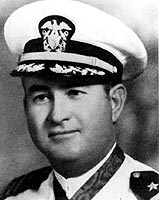
Samuel Glenn Fuqua was born in Laddonia, Missouri, on 15 October 1899. After a year at the University of Missouri and World War I service in the Army, he entered the U.S. Naval Academy in July 1919. Following graduation and commissioning in June 1923, he served in the battleship Arizona, destroyer McDonough and battleship Mississippi before receiving shore duty at San Francisco, California, in 1930-32. Lieutenant Fuqua served in other ships and shore stations during the mid-1930s, and was Commanding Officer of the minesweeper Bittern in the Asiatic Fleet in 1937-39.
After service at the Naval Training Station, Great Lakes, Illinois, in 1939-41, Lieutenant Commander Fuqua returned to USS Arizona as the ship's Damage Control Officer and First Lieutenant, and was on board her during Japan's 7 December 1941 raid on Pearl Harbor. Though knocked unconscious by a bomb that hit the ship's stern early in the attack, he subsequently directed fire fighting and rescue efforts. After the ship's forward magazines exploded, he was her senior surviving officer and was responsible for saving her remaining crewmen. For his distinguished conduct and heroism at that time, he was awarded the Medal of Honor.
During most of 1942, Fuqua was an officer of the cruiser Tuscaloosa. In 1943-44, he was assigned to duty at Guantanamo Bay, Cuba, and attended the Naval War College. Captain Fuqua was Operations Officer for Commander Seventh Fleet in January-August 1945, helping to plan and execute several amphibious operations in the Philippines and Borneo area. Following the War, he served in other staff positions, and in 1949-50 commanded the destroyer tender Dixie. After service as Chief of Staff of the Eighth Naval District, he retired from active duty in July 1953, receiving at that time the rank of Rear Admiral on the basis of his combat awards. Rear Admiral Samuel G. Fuqua died at Decatur, Georgia, on 27 January 1987.
This page features our only view of Rear Admiral Samuel G. Fuqua, USN.
| If you want higher resolution reproductions than the "Online Library's" digital images, see: "How to Obtain Photographic Reproductions." |
Click on the small photograph to prompt a larger view of the same image.
|
Medal of Honor citation of Captain Samuel Glenn Fuqua (as printed in the official publication "Medal of Honor, 1861-1949, The Navy", page 189): |
| If you want higher resolution reproductions than the "Online Library's" digital images, see: "How to Obtain Photographic Reproductions." |
Page made 30 December 2000